Tradition
About Andrew Cusack
 Writer, web designer, etc.; born in New York; educated in Argentina, Scotland, and South Africa; now based in London.
Writer, web designer, etc.; born in New York; educated in Argentina, Scotland, and South Africa; now based in London. read more
News
Blogs
Reviews & Periodicals
Arts & Design
World
France
Mitteleuropa
Knickerbockers
Argentina
The Levant
Africa
Cape of Good Hope
Netherlands
Scandinavia
Québec
India
Muscovy
Germany
Academica
Vive le Roi!
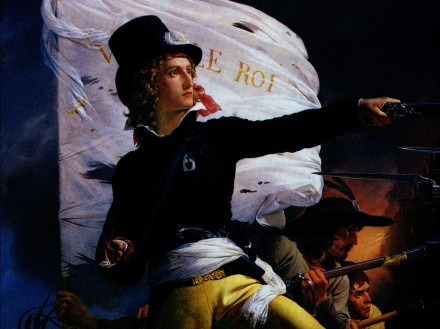
Today we should remember the victims of the French Revolution: the 4,000 prisoners drowned in the Loire by the Republic; the 2,000 Vendéens shot at Angers, half of them women; the 1,500 on the Ile de Noirmoutier; the 1,500 killed in the forest of Vezins; the 800 in the quarries of Gigant; and of course the King, his Queen, and their young son.
The Death of Marat
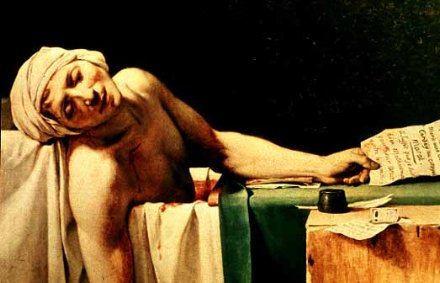
The thirteenth of July is also the day that the brave heroine of France, Charlotte Corday, killed the murderous revolutionary swine Jean-Paul Marat. Marat received his M.D. from St Andrews, and his villainy is remembered in the annual Kate Kennedy Procession, in which he is rightfully described as a “paranoid demagogue.”
The assasination inspired David to paint his famous depiction of the event. It is one of my favourite paintings, and a brilliant piece of propaganda portraying a bloodthirsty hatemonger as an angelic martyr.
Remembrance via the great Irish Elk.
Shakespeare the Catholic?
The debate continues:
In his lifetime, English priests could train only on the continent in Flanders or France. Some guess the arrest and horrific execution of the Jesuit missionary Father Edmund Campion persuaded the young Shakespeare to change course.
Catholic faith and sympathy for those suffering under the anti-Catholic reign of Queen Elizabeth and King James I. Scholars are also marshalling historical evidence that suggests Shakespeare was in fact allied to England’s “old faith” — that of the Catholic Church.
TCR News
Muggeridge on Orwell
Read this interesting piece on George Orwell by none other than Malcolm Muggeridge.
On athletics
“…the Laws of Nature and of Nature’s God…”
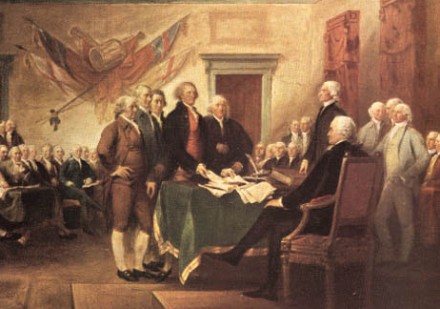
Detail from John Trumbull’s ‘Signing of the Declaration of Independence‘.
“When in the Course of human events, it becomes necessary for one people to dissolve the political bands which have connected them with another, and to assume among the powers of the earth, the separate and equal station to which the Laws of Nature and of Nature’s God entitle them, a decent respect to the opinions of mankind requires that they should declare the causes which impel them to the separation.
We hold these truths to be self-evident, that all men are created equal, that they are endowed by their Creator with certain unalienable rights, that among these are Life, Liberty and the pursuit of Happiness.”
Two-hundred-and-twenty-eight years ago today, three men with degrees from St Andrews signed the Declaration of Independence, and thus the United States were born (or so the story goes; their independence was only properly established in 1783). Those three were Mr. Benjamin Franklin (Hon. LLD, 1759), Mr. James Wilson (M.A., 1762), and the Rev. John Witherspoon (D.Div., 1764). Rev. Witherspoon was President of Princeton University from 1768 to his death in 1794, whereas Wilson became a justice of the Supreme Court after it was established. Both Franklin and Wilson went on to sign the Constitution as well, two of only eight people who signed both.
Totalitarian Pacifism
George Orwell: a man of remarkable prescience.
Via In Pectore.
Charles I, Emperor, King, Saint!
Almighty God, Lord of Lords and King of Kings, in Your infinite fatherly love you are keeping watch over the fate of men and nations. You called Your servant, Emperor and King Charles of the House of Austria, to serve as a father to his peoples in difficult times and to promote peace with all his strength. By sacrificing his life, he sealed his willingness to fulfill Your holy will.
Grant us the grace, with his intercession, to follow his example and serve the true cause of peace, which we find in the faithful fulfillment of Your holy will. We ask this through him, Jesus Christ our Lord, who lives and reigns with You and the Holy Spirit, one God, forever and ever. Amen.
On Reagan
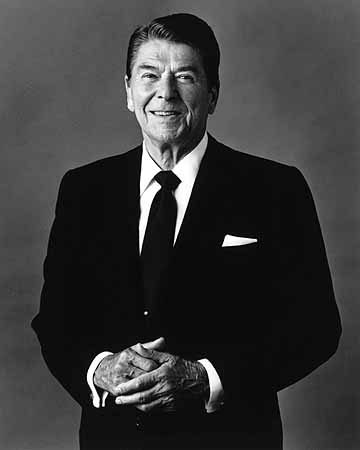
Those in the United States who think the Soviet Union is on the verge of economic and social collapse [are] wishful thinkers who are only kidding themselves.
Arthur Schlesinger, Jr., the famous historian, said these words two years into the Reagan presidency, reflecting the general attitude of the liberal establishment in America.
One year later, in March of 1983, Reagan made his famous speech in which he called a spade a spade. The Soviet Union was “an evil empire” and “the focus of evil in the modern world.”
Roger Kimball notes Anthony Lewis of the New York Times described the speech varyingly as “primitive — the only word for it,” “simplistic,” “sectarian,” “terribly dangerous.” Anthony Lewis sitting in the comfort of Manhattan could afford to make such judgements.
Natan Sharansky couldn’t:
In 1983, I was confined to an eight-by-ten-foot prison cell on the border of Siberia. My Soviet jailers gave me the privilege of reading the latest copy of Pravda. Splashed across the front page was a condemnation of President Ronald Reagan for having the temerity to call the Soviet Union an “evil empire.” Tapping on walls and talking through toilets, word of Reagan’s “provocation” quickly spread throughout the prison. We dissidents were ecstatic. Finally, the leader of the free world had spoken the truth – a truth that burned inside the heart of each and every one of us.
And it was only a few years later that the whole impressive edifice of communism came crashing down.
Lech Walesa:
When talking about Ronald Reagan, I have to be personal. We in Poland took him so personally. Why? Because we owe him our liberty. This can’t be said often enough by people who lived under oppression for half a century, until communism fell in 1989.
An Acceptable Marseillaise
It’s a tune we all know and love. And who can deny getting a bit sentimental during the scene in Casablanca when they sing it? But as all good traditionalists know, the lyrics to le Marseillaise are downright vulgar, republican, and revolutionary. So here we have reproduced the thoroughly-acceptable lyrics used in the die-hard Catholic region of la Vendée, and supposedly still sung today:
catholique,
Le jour de gloire est arrive.
Contre-nous de la République,
L’étendard sanglant est levé,
L’étendard sanglant est levé!
Ontondez-vous dans tchiés campagnes
Les cris impurs diaux scélérats?
Le venant duchque dans vous bras
Prendre vous feuilles et vous femmes.
Aux armes Vendéens! Formez vous bataillons!
Marchons! Marchons!
Le sang daux Bieux rougira nos seillons!
Perhaps this could be a marching tune for the annual Paris-Chartres pilgrimage?
Louis XVII, requiescat in pace…
An interesting story for all my fellow traditionalists.
PARIS – 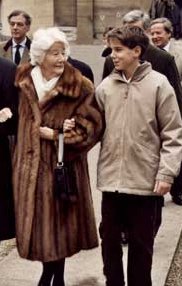 France laid to rest one of its most intriguing mysteries on Tuesday when it installed the tiny heart of Louis XVII – the son of beheaded king Louis XVI and queen Marie-Antoinette – in a royal crypt outside Paris.
France laid to rest one of its most intriguing mysteries on Tuesday when it installed the tiny heart of Louis XVII – the son of beheaded king Louis XVI and queen Marie-Antoinette – in a royal crypt outside Paris.
European aristocrats were among the 2,500 people who packed into the Saint-Denis Basilica north of Paris to watch the 209-year-old heart in its crystal vase given a final burial after spending a long period as a much-traded curiosity in the wake of the French Revolution.
A 12-year-old descendant of France’s former royal family, Amaury de Bourbon-Parme, handed over the heart in a formal Mass broadcast to another 1,000 people watching outside. The presiding priest, Archbishop Jean Honore, paid homage to the “lost child who knew nothing of what he was and of what he is”.
Louis-Charles, 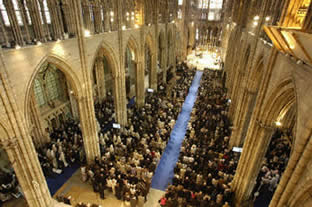 the so-called “lost dauphin” who would have reigned as Louis XVII, died of tuberculosis at the age of 10 on June 8 1795 in a windowless cell in the French capital’s Temple Prison, where he had been incarcerated with his parents before they were guillotined.
the so-called “lost dauphin” who would have reigned as Louis XVII, died of tuberculosis at the age of 10 on June 8 1795 in a windowless cell in the French capital’s Temple Prison, where he had been incarcerated with his parents before they were guillotined.
“This is a way to give this child-martyr, who passed away in tragic circumstances and around whom mystery swirled for more than 200 years, a proper death,” said Charles-Emmanuel de Bourbon-Parme, one of Louis XVII’s relatives.
(Agence France Presse)
The University Maces
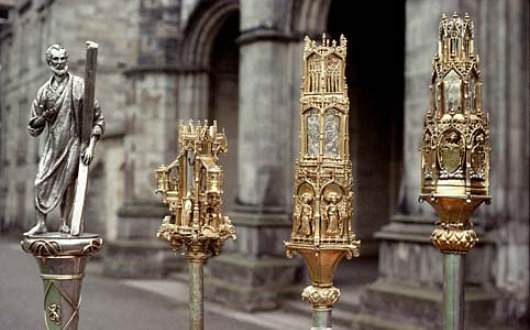
On my last day in St Andrews before summer break, Michelle Romero and I were lucky enough to finagle our way into a private showing of the University’s maces to the Kate Kennedy Club, organized by the Head Janitor & Bedellus, Jim Douglas, M.A. It was amazing. The metalwork on these maces (six in total) is so intricate and beautiful.
The late R.G. Cant said that if he had to put a value to the maces, Bishop Kennedy’s mace (made in 1461 in Paris) would be worth £10 million, and the mace of the Faculty of Arts would be £5 million, though in effect they are priceless. I have to admit it was nearly frightening to hold £10 million pounds in your hands.
It’s such a shame that the modern mace for the whole of the University (furtherst left in the photo) pales in comparison to the others, especially since it is the mace used at Chapel and thus the mace used most often. Mr. Douglas told us that the rod of the Rector’s mace (not pictured) is actually a broomstick painted black. Apparently, the Principal and Vice-Chancellor, Dr. Brian Lang, is going to have it replaced with a lengthened ebony rod.
Search
Instagram: @andcusack
Click here for my Instagram photos.Most Recent Posts
- Amsterdam November 26, 2024
- Silver Jubilee November 21, 2024
- Articles of Note: 11 November 2024 November 11, 2024
- Why do you read? November 5, 2024
- India November 4, 2024
Most Recent Comments
- on The Catholic Apostolic Church, Edinburgh
- on Articles of Note: 11 November 2024
- on Articles of Note: 11 November 2024
- on Why do you read?
- on Why do you read?
- on University Nicknames in South Africa
- on The Situation at St Andrews
- on An Aldermanian Skyscraper
- on Equality
- on Rough Notes of Kinderhook
Book Wishlist
Monthly Archives
Categories


